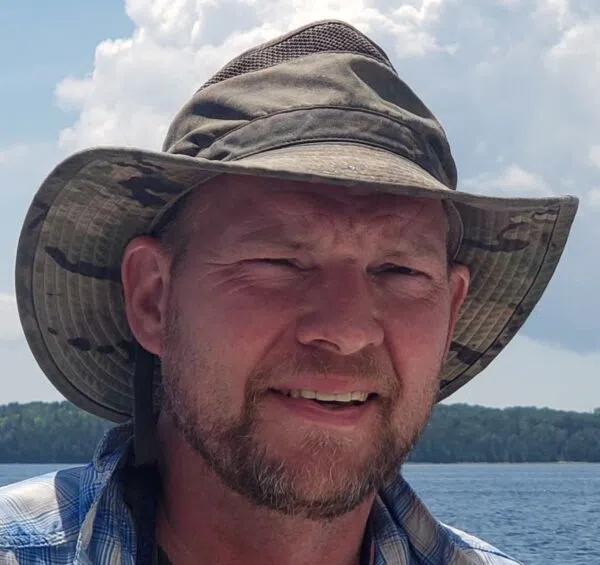Huron-Bruce Green Party of Ontario Candidate Matthew Van Ankum says some of his priorities are protecting agricultural land, creating affordable housing solutions and getting more bang for the taxpayer’s buck.
Van Ankum, who is a farmer, says he first wanted to make a change in local issues in 2022 during the discussion over whether or not to have a Deep Geological Repository in the Municipality of South Bruce, explaining, “That’s what pushed me to the point of going beyond being a member of the Green Party and supporting them financially. Actually trying to broadcast what you feel is important to an audience. It’s a leap, but I found it a very good exercise in staying fresh on what’s going on around me.”
Van Ankum ran in the 2022 Ontario general election as well. He shares some of the reasons he’s running again, saying, “I’m unhappy with what conservatives have done and I don’t think we’re getting bang for our buck as far as our taxes. I’m feeling pressure from my property tax as well as my insurance bill running a small business. I think they’re too high and I guess I need to do something to try to hold who I feel is at fault accountable for the situation we’re in and try for betterment.”
Van Ankum says he feels strongly about the need for more affordable housing, noting, “We’re not building houses that people can afford.” He adds, “We need to figure out what we can build for the $250,000 – $300,000 mark.” He feels, if you can pay $1,600 rent, then you might be able to pay for a $300,000 mortgage, but notes “you need something that’s easy to heat and with low maintenance, and what does that look like?”
Van Ankum says it shouldn’t be all about rental housing, noting, “Ideally, you would own something. you’d have something to be proud of and you have something to improve and it gets you on that real estate ladder, which has been one of the top investments over the last 50 years.”
He also wants a concrete division between agricultural, industrial and residential lands. Van Ankum says, “Through the preservation of AG1 lands,” (Agricultural or horticultural land).
He explains, “Basically, as we age as a province that we have a division between countryside and urban instead of a sprawl.”
Van Ankum doesn’t want to see more ‘ribbon development,’ which is a term that refers to development that spreads outward from a more densely developed settlement area, sometimes along a rail line, coast line or most often nowadays, a road.
He says, “It’s a situation that doesn’t allow for the beauty and the prettiness of the countryside to be prominent.”
He says countryside is something he doesn’t want to lose. “It’s drawing a permanent line in the sand that shall not be crossed,” says Van Ankum who says even small towns grow outward and encroach on agricultural land. “I love living in the country and I can see why other people want that two acres in the country and that big country lot, I get that, but that type of growth is not in the best interest of Ontario 50 years down the road.”
“You just have to stop somewhere otherwise we’re going to lose what we have. For me, as a farmer, I feel that the agricultural land is something that we need to preserve,” says Van Ankum.
Van Ankum also wants to do away with slip-and-fall lawsuits in Ontario, saying, “I think it’s a burden on small business.”
He feels it negatively affects agritourism and small businesses, proposing, “Overall if we just assume risk. There’s risk to how we walk through life and accept that, and don’t expect the government to coddle us we’ll be stronger and richer as a society.”
Van Ankum says Perth-Wellington MPP Matthew Rae, who grew up on a farm near Harriston tabled a bill last year that received royal assent. The Growing Agritourism Act requires agritourism businesses to describe inherent risks in a sign on the property or in a contract, and if that is done, action can’t be taken against the business if a participant is harmed as a result of a risk inherent in agritourism.
Van Ankum is inspired by the success of that legislation, adding, “If he can do it to protect agritourism, because the insurance industry was wanting nothing to do with that becasue there were too many lawsuits.”
When it comes to slip-and-fall lawsuits, he says, “I think it’s net loss for society because as a small business owner you have something like that hanging over your head, then you’re not going to do as good of a job as you could.”
As for being out on the campaign trail, he says there are some all candidate meetings planned for the riding, and he will be making use of re-usable campaign signs this election to cut down on waste.
Van Ankum’s farming practices have a focus on sustainability. He prioritizes quality lamb and beef production through direct harvesting of forage and seasonal grazing. Fertility on the farm is maintained through the application of liquid pig manure on hay fields, minimizing runoff. You can read his bio on the Green Party of Ontario’s website.










